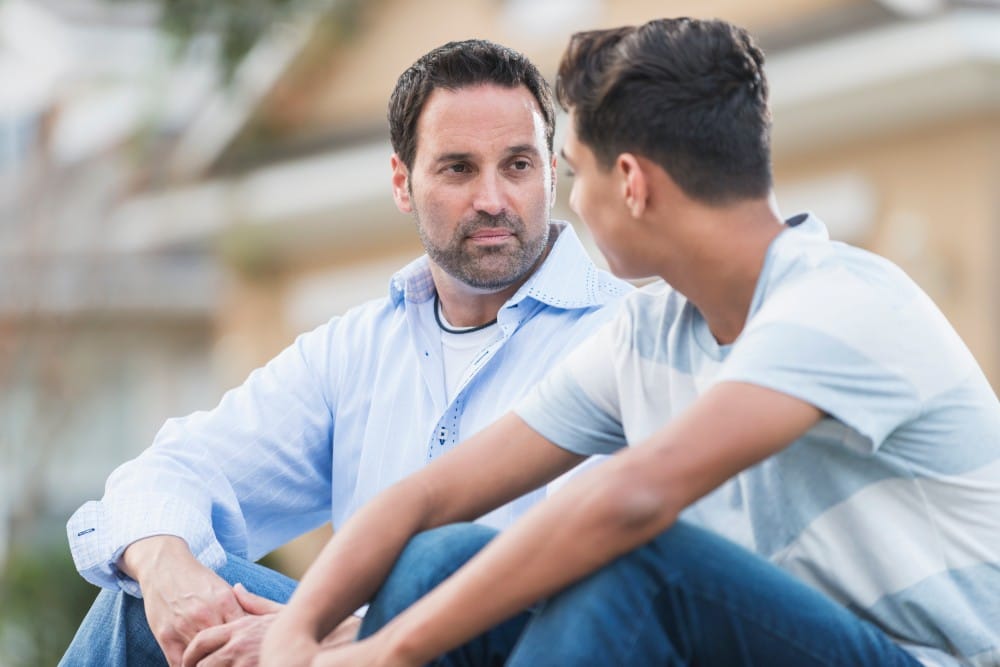When a couple decides to divorce, it affects the entire family. So how should you approach talking to kids about divorce? How can you keep the impact of divorce on children to a minimum?
This is one of life’s situations where it’s important to remember that you can’t control anyone else’s feelings, actions, or emotions.
You can, however, control your own – which is much easier said than done in emotionally-charged situations like this.
Here are a few tips for talking to children about divorce and what to avoid. You’ll get through this together.

Everyone responds to the news of a divorce differently. In general, kids’ thoughts, emotions, reactions, and coping mechanisms differ depending on their age group.
But your kids aren’t robots; they’re people with unique personalities. You can’t write a math equation about kids and divorce.
Let’s first take a look at how the effects of divorce on children differs by age group.
Divorce and Toddlers
Babies and very young children can’t really understand what’s happening around them the same way kids between about two and five can.
Kids five and under can communicate a little better than babies but they still have a hard time using cognitive skills and piecing together future possibilities. For kids in this age range try the following strategies:
School-age Children
Kids up to ten can express themselves a little better and they’ve started to form relationships with people outside the family like friends and teachers. However, kids this age also have a tendency to see things in stark terms (as do many adults).
Teenagers
Pre-teens and teens will probably have a better grasp of what’s happening and the potential consequences. Remember that they aren’t quite adults, but they aren’t children, either.
Not every conversation needs to be super formal: sometimes older kids may want to ask questions via text following the initial in-person conversation.
Adult Children
Adults aren’t immune to the impact of divorce on children. In fact, they may harbor extreme guilt feeling like you’ve stayed together unhappy for their sake. They may even feel doubt about their own perception of relationships.

There’s no step-by-step guide for talking to children about divorce. Go with the flow and cater to their emotions.
Remember that you’re the adult. In many cases, one parent may not want the divorce. No matter the situation, you need to keep things together and set a healthy example – even/especially in uncomfortable situations like this.
Sometimes, it’s okay to answer “I don’t know” if you aren’t sure about your emotions. Let your kids know it’s okay to be uncertain about your feelings.
Tips for Talking to Children About Divorce
Talking to kids about divorce isn’t easy but you can get through it together.
Things to Avoid to Minimize the Effects of Divorce on Children
People have a tendency to play out tough conversations in their head, but nothing ever goes as planned. Instead, try to avoid these things below. This will help you engage in a constructive conversation.

At Haefner Law Office in St. Louis, family law is all we do. We understand that divorce is a difficult time for the whole family and we’re here to help minimize its impact to the best of our ability.
Our team has decades of combined experience in contested and uncontested divorce, paternity, child custody and support, and all other aspects of family law. Our skills make us a great choice for handling even intense cases and protecting our clients.
If you or a loved one are facing a divorce, don’t hesitate to contact Haefner Law Office or give us a call at 314-200-6101 to inquire about our flat rate pricing and areas of expertise.
May 21st, 2025
Divorce, Divorce Preparation, Missouri Divorce Laws, Property Division
May 20th, 2025
Child Custody, Family Law, Preparation
May 14th, 2025
Child Support, Divorce, Divorce Process, Family Law, Missouri Divorce Laws